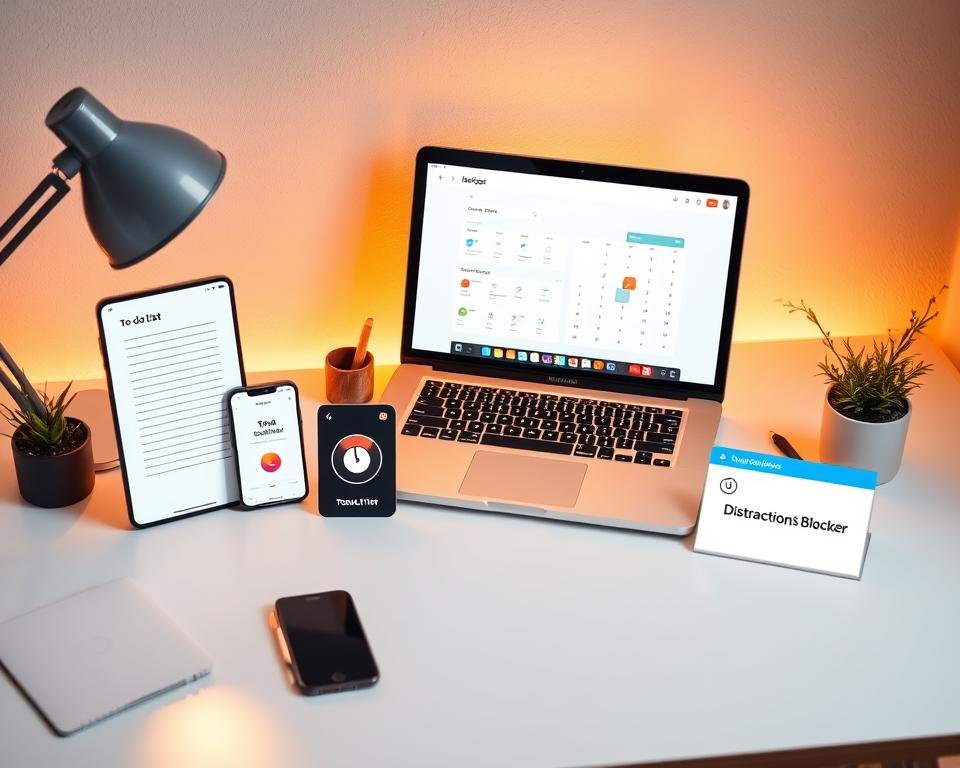I’ve struggled with putting off tasks. I learned that overcoming procrastination is more than being disciplined. It’s about knowing why we delay and finding ways to beat it.
By figuring out why we delay, we can change. This boosts our productivity. In this article, I’ll share tips to fight procrastination and reach your goals.
Key Takeaways
- Understand the reasons behind your procrastination
- Develop strategies to overcome procrastination
- Boost your productivity with effective techniques
- Learn to prioritize tasks and manage time
- Improve your focus and concentration
Understanding Procrastination: What It Is and Why It Happens
It’s key to know why we put things off. Procrastination isn’t just about managing time. It’s also about how we feel and think.
Looking into why we procrastinate shows it’s tied to how we handle our emotions. We might delay tasks to avoid feeling stressed or overwhelmed.
The Psychology Behind Procrastination
Procrastination isn’t just laziness. It’s a way to cope with stress. Emotional regulation is key, as we avoid tasks that make us feel bad. Knowing this can help us find ways to avoid procrastination.
Common Triggers for Procrastination
Finding out what makes us procrastinate is important. Different things trigger it for everyone. Common ones include fear of failure, perfectionism, and task aversion. Knowing these can help us tackle them.
- Fear of not meeting expectations
- Perfectionism leading to an inability to start a task
- Aversion to tasks that are perceived as boring or too difficult
Short-Term vs. Long-Term Procrastination
There are two types of procrastination. Short-term is about delaying tasks for now. Long-term is a habit that affects our lives and goals. Knowing the type helps us find the right way to deal with it.
By understanding why we procrastinate and its different forms, we can start to manage our time better. This helps us reduce procrastination.
Identifying Your Procrastination Style
Knowing how we procrastinate helps us find ways to stop it. Procrastination is complex, and knowing its types is key to finding good procrastination solutions.

Fear of Failure: Avoidant Procrastination
Avoidant procrastination is when we fear failure so much we delay tasks. This fear can stop us from doing important things until the last minute. To beat this, we should break big tasks into smaller steps. This makes them less scary and easier to do.
- Identify the task you’re avoiding and the reasons behind it.
- Break down the task into smaller, actionable steps.
- Create a schedule to tackle each step.
Too Many Choices: Decisional Procrastination
Decisional procrastination is when too many choices confuse us and slow us down. To fight this, we can make decisions easier by setting clear rules and focusing on what’s most important.
- List all available options.
- Establish clear criteria for making a decision.
- Evaluate each option against your criteria.
Perfectionism and Procrastination
Perfectionism can also cause us to delay, as we might think our work isn’t perfect. We need to remember that perfect isn’t always needed. Sometimes, “good enough” is, well, good enough.
By knowing our procrastination style and using the right strategies, we can start beating procrastination. We can find tips to beat procrastination that really help us.
Effective Time Management Strategies
Learning to manage your time well is key to beating procrastination and getting more done. The right strategies help you stay focused and handle tasks better.

The Pomodoro Technique Explained
The Pomodoro Technique is a simple way to boost your productivity. It means working in 25-minute chunks, then taking a 5-minute break. This keeps you on track and stops burnout.
To use it, pick a task, set a timer, and work without breaks until it beeps. After four cycles, take a 15-30 minute break.
Benefits of the Pomodoro Technique include better focus, less distraction, and better time planning. It lets you make good progress without feeling too much stress.
Prioritization: The Eisenhower Matrix
The Eisenhower Matrix helps you sort tasks by urgency and importance. It puts tasks into four groups: urgent and important, important but not urgent, urgent but not important, and not urgent or important. Focus on urgent and important tasks to manage your time well and cut stress.
- Urgent and Important: Tasks that need immediate action.
- Important but Not Urgent: Tasks key for long-term goals.
- Urgent but Not Important: Tasks that can be given to others.
- Not Urgent or Important: Tasks that can be skipped.
Time Blocking for Better Focus
Time blocking means setting tasks into fixed, uninterrupted time slots. This method keeps you focused on one task and avoids multitasking, which can slow you down. By dedicating time to a task, you can do it without distractions, leading to better work and more efficiency.
To start time blocking, list your tasks, schedule specific times for each, and stick to it. Remember to include breaks and time for yourself to keep a good balance between work and life.
Using these time management strategies daily can help you stop procrastination and reach your goals. Whether it’s the Pomodoro Technique, the Eisenhower Matrix, or time blocking, find what works for you and stick with it.
The Power of Setting Goals
Setting clear goals is key to staying focused and motivated. It helps create a roadmap to achieve your goals and beat procrastination.
Effective goal-setting uses several strategies. One top method is the SMART goal framework. It makes sure goals are specific, measurable, achievable, relevant, and time-bound.
SMART Goals: A Clear Framework
The SMART framework is a great tool for setting goals. It ensures goals are specific and clear. Goals should also be measurable to track progress.
They must be achievable to keep motivation up. Goals should be relevant to your overall goals. And they must be time-bound to create urgency.
Breaking Down Big Tasks into Smaller Steps
Big tasks can feel overwhelming and lead to procrastination. Breaking them down into smaller steps makes them easier to handle. This way, you can feel a sense of accomplishment as you finish each step.

The Importance of Deadlines
Deadlines are key to achieving your goals. They create a sense of urgency and focus. This helps avoid procrastination by setting a clear time frame for tasks.
Deadlines also help with planning and time management. They ensure goals are met on time.
By using these strategies daily, you can beat procrastination and reach your goals. Setting effective goals is a powerful way to succeed and boost productivity.
Overcoming Mental Barriers
To beat procrastination, we must tackle our mental blocks. Fears, anxieties, and doubts can stop us. Finding ways to overcome these is key to reaching our goals.
Dealing with Fear and Anxiety
Fear and anxiety often lead to putting things off. We might avoid tasks because we’re scared of failure or worried about the outcome. Changing how we think can help.
Instead of fearing failure, we can see it as a chance to learn. Saying “I’ll learn from this” can ease our worries. This mindset shift helps us take action.
Strategies for Building Confidence
Confidence is vital to overcoming mental blocks. Without it, we tend to delay. Achieving small tasks can build our confidence.
Positive self-talk also boosts confidence. Encouraging ourselves and celebrating our wins helps us feel more positive. This reduces procrastination.
The Role of Self-Compassion
Being kind to ourselves is important too. Self-criticism can lead to doubt and delay. Treating ourselves with kindness helps.
Self-compassion reduces doubt and builds a better self-image. This makes it easier to overcome procrastination and reach our goals.
| Mental Barrier | Procrastination Strategy | Outcome |
|---|---|---|
| Fear of Failure | Reframe mindset, focus on positive outcomes | Reduced anxiety, increased motivation |
| Low Confidence | Focus on small wins, practice positive self-talk | Increased confidence, improved productivity |
| Self-Doubt | Practice self-compassion, treat yourself with kindness | Reduced self-doubt, improved self-image |
Understanding and tackling mental barriers helps us fight procrastination. By using these strategies, we can overcome procrastination and achieve our goals.
Staying Motivated During Challenges
Beating procrastination is not just about knowing why we do it. It’s also about keeping motivated when things get tough. When we hit obstacles, it’s easy to lose our drive. But, with the right tactics, we can keep moving forward and reach our goals.
The Importance of Intrinsic Motivation
Intrinsic motivation comes from enjoying what we do. It helps us push through hard times. To boost this, focus on what makes your tasks satisfying or meaningful to you.
For example, if you’re on a project, find the parts you like best. Or the parts that help you reach your goals. This way, you’ll stay motivated.
Tips to Enhance Intrinsic Motivation:
- Identify tasks that align with your personal goals and values.
- Celebrate small wins to maintain a sense of accomplishment.
- Find the enjoyable aspects of your tasks.
Visualizing Success: A Motivational Tool
Visualizing success is a great way to stay motivated. Imagine yourself achieving your goals to boost your drive. It helps you stay focused, even when things get hard.
To do this, take a few minutes each day to imagine yourself succeeding. Use all your senses to make it real. For example, if you’re working on a project, imagine how proud you’ll feel when it’s done.

Creating an Accountability System
Having someone to report to can really help you stay on track. Share your goals and progress with a friend or mentor. This way, you get support and encouragement.
| Accountability Method | Description | Benefits |
|---|---|---|
| Regular Check-ins | Schedule regular meetings with a friend or mentor to discuss your progress. | Provides support and encouragement, helps stay on track. |
| Study Groups | Join or form a group with others working towards similar goals. | Fosters a sense of community, promotes mutual support. |
| Accountability Apps | Use apps designed to track progress and provide reminders. | Offers a convenient way to stay accountable, tracks progress. |
By using these strategies, you can stay motivated and overcome procrastination. The most important thing is to find what works for you and stick with it.
Creating an Optimal Work Environment
To boost productivity, make a workspace that helps you focus and keeps distractions away. Our work area greatly affects how well we stay on task and avoid putting things off.
Distraction-Free Spaces
A space free from distractions is key to staying focused. Find and remove things that distract you, like social media or chatty coworkers. Use tools like website blockers or noise-cancelling headphones to stay focused.
Creating a quiet workspace helps fight procrastination. You might need a special area for work or soundproofing to block out noise.
Organizing Your Workspace for Productivity
An organized workspace is vital for being productive. Decluttering your workspace often keeps you focused and saves time looking for things. Use a filing system, both physical and digital, to stay organized.
Think about using a task management system to track your tasks and deadlines. This helps you focus on what’s important and manage your work better.

Incorporating Breaks to Refresh Your Mind
Regular breaks refresh and keep you focused. The Pomodoro Technique is a good way to work in focused 25-minute blocks, with a 5-minute break in between. After four blocks, take a 15-30 minute break.
Also, add activities that relax and recharge you, like meditation or a short walk. Breaks in your work routine boost productivity and prevent burnout.
Leveraging Technology to Combat Procrastination
In today’s digital world, technology has many ways to beat procrastination. The right tools and strategies can boost productivity. They help keep tasks on track.
Productivity Apps to Consider
Many apps help manage time better. Todoist and RescueTime are top picks. They track time and show how productive you are.
Key Features to Look for in Productivity Apps:
- Task management capabilities
- Time tracking features
- Reminders and notifications
- Integration with other tools and services

Utilizing Digital Calendars and Reminders
Digital calendars and reminders keep you organized. They help meet deadlines without last-minute stress.
To get the most from digital calendars, do this:
- Schedule tasks with specific time slots
- Set reminders for upcoming deadlines
- Share calendars with team members or accountability partners
The Benefits of Focused Music and Sounds
Focused music and sounds help concentrate and cut distractions. Music without lyrics or nature sounds is perfect for work.
Some great choices are:
- Lo-fi hip hop music
- Nature sounds like rain or ocean waves
- Classical music compositions
Using these tech tools daily can help fight procrastination. It helps reach your goals.
Developing Positive Habits for Productivity
Being productive isn’t just about doing more. It’s about making habits that stick. By focusing on good habits, you can boost your productivity and fight off procrastination. It’s all about understanding habits and using strategies that help you reach your goals.
The Habit Loop: Cue, Routine, Reward
The habit loop is key to understanding habits. It has a cue, a routine, and a reward. The cue starts the habit, the routine is the action, and the reward is the good feeling you get.
For example, to start exercising in the morning, the cue is waking up early. The routine is exercising, and the reward is feeling accomplished or enjoying breakfast after. Knowing this loop helps you stop procrastination by replacing bad habits with good ones.
| Cue | Routine | Reward |
|---|---|---|
| Waking up at 6:00 AM | Morning exercise | Sense of accomplishment |
| Feeling stressed at work | Taking a short walk | Reduced stress |
| Arriving at the office | Responding to urgent emails | Feeling organized |
Morning Routines to Kickstart Your Day
Starting your day with a morning routine is great. You can meditate, journal, or do a quick workout. A productive morning sets a positive tone for the day and helps you stay focused.
Some good morning routines include:
- Meditating for 10 minutes to clear your mind
- Writing down your goals and priorities for the day
- Doing a short exercise to boost energy

Evening Routines for Better Planning
An evening routine helps you relax and get ready for tomorrow. It might be reviewing your day, planning for tomorrow, or just unwinding. A consistent evening routine improves sleep and makes you feel refreshed for the next day.
Here are some tips for a good evening routine:
- Reviewing your day’s accomplishments and challenges
- Planning your tasks for the next day
- Doing something relaxing, like reading or listening to music
By adding these habits to your life, you can become more productive and beat procrastination. Remember, being consistent and patient is key. Building new habits takes time.
The Role of Mindfulness and Meditation
Mindfulness and meditation can help you beat procrastination. They make you more aware of your thoughts and feelings. This helps you manage procrastination better.
How Mindfulness Reduces Procrastination
Mindfulness keeps you in the present moment. It helps you stay focused. This way, you’re less likely to worry about the past or future.
- Mindfulness lowers stress and anxiety, which can cause procrastination.
- It helps you focus on what you need to do.
- Mindfulness also improves self-control, making it easier to start tasks.
Simple Meditation Techniques to Try
Meditation boosts mindfulness. Here are easy techniques to try:
- Focused Breathing: Just watch your breath, without changing it.
- Body Scan: Lie down or sit, focusing on each body part, from toes to head.
- Walking Meditation: Notice your feet touching the ground, your legs moving, and your breath.
Incorporating Mindfulness into Your Daily Routine
Adding mindfulness to your daily life is easy and rewarding. Here’s how:
- Begin your day with a short meditation.
- Be mindful while eating or showering.
- Take short breaks for deep breathing exercises.
By making mindfulness a daily habit, you’ll find better ways to fight procrastination. Regular practice helps you stay focused and motivated. This way, you can beat procrastination for good.
When to Seek Help for Procrastination
Procrastination is common, but it can become a big problem. Knowing when it’s time to get help is key. This helps you find ways to beat it.
Persistent Procrastination Issues
If procrastination is stressing you out or stopping you from reaching your goals, it’s time to get help. Look for the reasons behind it, like fear or anxiety. Then, find ways to manage your time better and set goals.
Resources for Support
There are many ways to fight severe procrastination. You can join support groups to share and learn from others. Or, you can talk to therapists or productivity coaches for advice on managing your time and setting goals.
By asking for help and using the right resources, you can make a big change. This can help you overcome procrastination and boost your productivity.
FAQ
What is procrastination, and why do people do it?
Procrastination is when you delay tasks or decisions. This can make you feel guilty, stressed, and less productive. People procrastinate for many reasons, like fear of failure or wanting to be perfect.
How can I identify my procrastination style?
Knowing your procrastination style is key to beating it. You might avoid tasks because you’re scared of failing or succeeding. Or, you might delay because you’re overwhelmed by choices. Some people put off tasks because they feel they’re not good enough.
What is the Pomodoro Technique, and how can it help?
The Pomodoro Technique is working in 25-minute focused blocks, then taking a 5-minute break. It helps you stay focused, avoid burnout, and stay productive.
How can I stay motivated when faced with challenges?
Staying motivated is key to beating procrastination. Focus on what you enjoy. Visualize your success, set up accountability, and celebrate small wins.
Can technology help me overcome procrastination?
Yes, technology can fight procrastination. Apps like Todoist and RescueTime keep you on track. Digital calendars and reminders help you meet deadlines.
How can I create an optimal work environment to boost productivity?
Make a distraction-free space and organize your area. Take regular breaks to stay focused and avoid burnout. Use music and sounds to help concentrate.
What role does mindfulness play in reducing procrastination?
Mindfulness helps you notice your thoughts and feelings. This makes it easier to fight procrastination. Simple meditation, like focusing on your breath, keeps you present and focused.
When should I seek help for procrastination?
If procrastination is a big problem, get help. Support groups and professionals offer guidance and support to beat severe procrastination.






